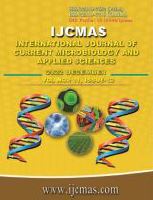


 National Academy of Agricultural Sciences (NAAS)
National Academy of Agricultural Sciences (NAAS)

|
PRINT ISSN : 2319-7692
Online ISSN : 2319-7706 Issues : 12 per year Publisher : Excellent Publishers Email : editorijcmas@gmail.com / submit@ijcmas.com Editor-in-chief: Dr.M.Prakash Index Copernicus ICV 2018: 95.39 NAAS RATING 2020: 5.38 |
Chickpea (Cicer arietinum L.) is one of the most cultivating pulse crops globally and in India, its productivity is limited blisteringly by Gram pod borer insect (Helicoverpa armigera) and Fusarium wilt disease. Pyramiding of these two biotic stress resistance in a single genotype is expected to increase crop productivity and reduces the usage of pesticides/fungicides by farmers, which boost economic viability in the cultivation of this crop. Hence, we planned to transfer the cry1Ac gene, which imparts pod borer resistance from BS 100B event, to Super Annigeri-1(SA-1), the wilt resistant variety bred through marker-assisted backcrossing.The F1 plants developed by SA-1 X BS 100B crosses were confirmed with cry1Ac gene-specific marker and polymorphic SSR marker (ICCM0299).The expression of the cry1Ac gene at the transcriptional level through reverse transcription polymerase chain reaction and at the protein level through enzyme-linked immuno sorbent assay was confirmed in F1. The presence of a single copy of a gene integration, stably, was confirmed through the inheritance of the cry1Ac gene and 3:1 segregation ratio in F2 using Chi-square test. BS 100B (donor parent), F1 and F2 plants, respectively recorded 21.47 µg, 20.43 µg and 15.31-21.17µg of Cry1Ac protein/g of leaf tissue in quantitative ELISA test that is enough to record pest resistance. This is the first study to combine resistance to both pod-borer and Fusarium wilt by intercrossing of one cry1Acevent (BS 100B) together with SA-1 developed through molecular breeding and developed progenies have shown resistance to both biotic stresses.
 |
 |
 |
 |
 |